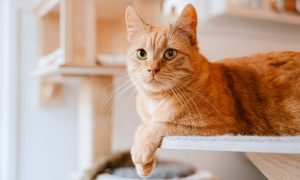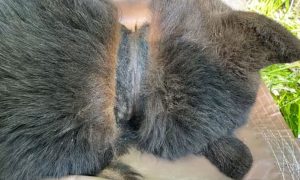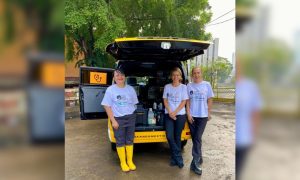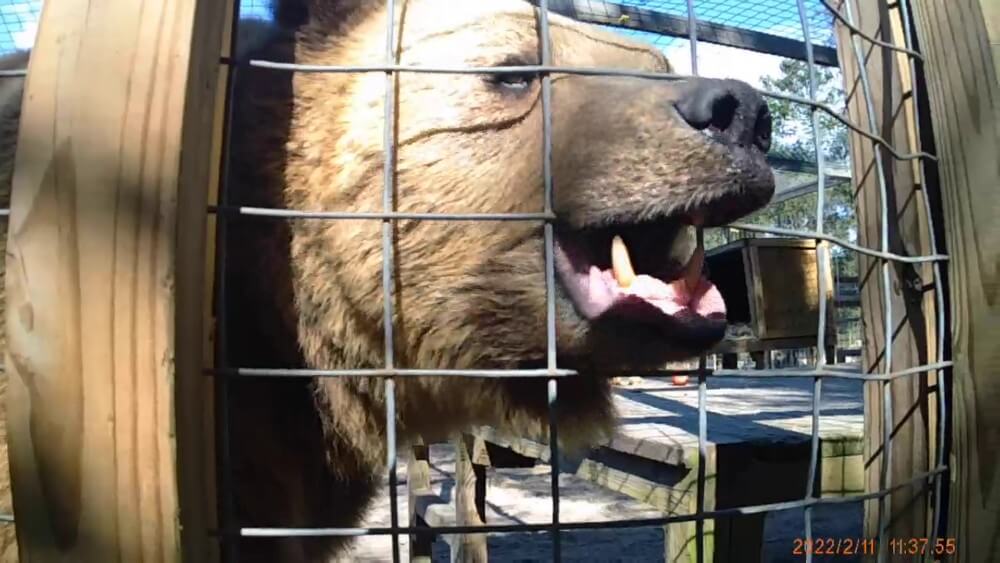A roadside zoo in Florida is under state and federal investigation following numerous documented violations of animal welfare laws, including for permitting violative public interactions with a young jaguar, cougar, and lion cubs, as well as with adult lions, a jaguar, and a bear, according to public records documents obtained by Lady Freethinker through public records requests.
Single Vision, a nonprofit organization in Melrose registered under owner Carl Bovard, advertises itself as a “wildlife sanctuary” that is “protecting our vanishing wild”, according to its Facebook page. While true and reputable wildlife sanctuaries don’t permit paid, hands-on contact with their animals, Single Vision’s offerings include taking photos, petting, and feeding numerous species — including baby bears, bobcats, caracals, servals, coatimundi, kinkajous, and young big cats, according to the website and social media postings as of August.
Single Vision’s website also advertises that big cats are available to travel off-site to celebrate “promotions, birthday parties, special events and to draw people to your fundraiser” and on-property “exclusive photo opportunities,” including “up-close and personal private photo sessions.”
True conservation messaging for exotic species, as outlined by animal welfare experts, requires highlighting that wild animals are wild — a cornerstone that conflicts with the reported atmosphere at Single Vision, as evidenced by Bovard’s citations for improperly keeping wildlife in public records documents and also several online comments, including a highly-starred review in which a visitor noted that the animals “are treated like pets.”
Bovard — whose professional background includes positions at other controversial and exploitative animal venues that use exotic animals for people’s “entertainment”, including Sea World, Jungleland Zoo, Busch Gardens, and T.I.G.E.R.S. Preservation Station – has been cited by both state and federal authorities for improperly keeping bear cubs and a young hyena in his porch and within his home. He also needed emergency treatment after “playing” with one of his mountain lions, who ripped his head open in a wound that required multiple stitches, according to public records documents.
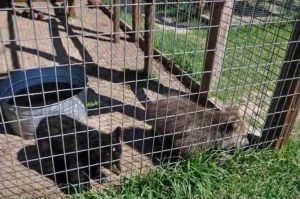
(Courtesy USDA)
This year alone, Single Vision has had violations of the federal Animal Welfare Act documented at two of its three most recent federal inspections, with a total 10 noncompliant issues– including three “critical” violations, the most serious category classified by the U.S. Department of Agriculture (USDA), the federal agency that oversees licensees. Overall, the facility has had noncompliances noted at 13 of 18 USDA inspections since 2014– or 72 percent – and a total of 46 documented issues.
Conditions documented at the federal level included animals going without adequate veterinary care, more than 30 documented violative hands-on interactions between members of the public and exotic animals, sanitation issues, enclosures in need of repair, and Bovard reportedly providing fraudulent veterinary information and threatening federal inspectors, according to USDA reports.
At the state level, Single Vision has been cited for issues including inadequate cage sizing and strength, escaped animals, incomplete records, and permitting public contact with bear cubs, according to records from the Florida Fish and Wildlife Conservation Commission (FWC), obtained by Lady Freethinker through public records request.
Single Vision’s USDA license currently is active through April 25, 2025. The nonprofit reportedly brings in about $182,690 in annual revenue according to Dun & Bradstreet, a company that tracks income for private businesses.
Bovard, who spoke with Lady Freethinker briefly by phone, said his facility complies with all animal welfare laws and referred to his facility’s last inspection with no noted noncompliant issues — which was on June 13, according to USDA records.
The facility was under both state and federal investigation as of July 20, according to documents received by Lady Freethinker from the USDA. Bovard denied any investigations were ongoing and said he had been cleared, including regarding the public contact with wild animals.
“That investigation has been completed and I was found innocent of all charges with the public, because none of the people were the public,” he said. “They’re friends, they’re zookeepers, they raised the cats that I have currently.”
When asked about the proliferation of social media posts online, in which individuals are shown in physical contact with wild animals and indicate in their comments section that they are visitors to Single Vision, Bovard said, “We abide by all the laws set by Fish and Wildlife and the USDA as far as contact with any of the animals.”

(Image via Facebook, redacted for privacy)
Dangerous Interactions, Veterinary Violations, and Other Issues at the Federal Level
Single Vision had no violations noted at its most recent inspection on June 13, according to the USDA report. But past inspections this year have documented numerous issues regarding veterinary care, public interactions with exotic animals, and the conditions in which the animals are kept.
Federal inspectors during an April 28 inspection noted a repeat offense of a female Geoffrey’s cat with a squinting eye, scab, and general hair loss going without veterinary care. Inspectors had previously pointed out the cat’s condition during a March 8 inspection, more than a month earlier. The report notes that Single Vision had claimed the cat’s condition had been discussed with his vet and in doing so “knowingly provided USDA officials false information,” according to the report.
Single Vision’s attending veterinarian, when contacted, denied evaluating the cat or talking about her condition with Single Vision. The vet also denied that Single Vision regularly requested annual veterinarian visits and added that she hadn’t signed off on a program of veterinary care in more than two years, according to the USDA reports.
“Most importantly, discussions with the attending veterinarian identified a complete lack of communication between the licensee and the attending veterinarian regarding proper veterinary care, nutritional and supplementation requirements, internal and external parasite control and other aspects of animal care and use,” the federal inspector wrote. “The licensee does not have regularly scheduled visits by the attending veterinarian to the premises and routinely disregards the AV’s [attending veterinarian’s] advice.”
The March inspection report identified 31 instances of inappropriate hands-on contact between members of the public and wild animals, including numerous people hugging, petting, and otherwise interacting with a 6-month-old jaguar, a young female cougar, and two young bear cubs. Numerous people also were allowed to touch, pet, and otherwise interact with adult lions and an adult jaguar, and one visitor was documented touching the muzzle of an adult bear, according to the reports.
“The licensee allows family members, personal friends, and other exotic animal exhibitors to interact with dangerous animals over 12 weeks of age without being under the direct control of a knowledgeable and experienced animal handler,” the inspector wrote. “At approximately 12 weeks of age, dangerous animals, such as tigers, lions, bears, and wolves become too big, too fast and too strong to be used [in] public contact.”

(Image via Facebook, redacted for privacy)
USDA inspectors previously had documented inappropriate visitor-animal contact – involving an adult bobcat and a bear cub who bit a visitor and drew blood – as early as May 2014.
Other issues identified at the March and April inspections this year included two geriatric, thin tigers who reportedly had no veterinarian consultation about their quality of life, missing acquisition records, and enclosures with wood rot, exposed nails, and a warped roof. Noted sanitation issues included accumulated feces, mud, and leftover food and a clogged drainage system in an otter enclosure, and a build-up of food and feces in a Geoffrey’s cat enclosure that “attracted numerous flying insects,” according to the reports.
The federal inspector also noted an adolescent spotted hyena living within Bovard’s residence, with reported free access to the home despite “numerous dangers in a house setting that can cause harm,” according to the report.
Other non-compliance over the year included incomplete records, enclosures in need of repair, an insufficient Environmental Enrichment Plan (EEP) for a bush baby, hybrid ruffed lemur, and owl monkey, murky brown water and water receptacles filled with weeds or algae, and several citations for an incomplete veterinary program, and not having a facility representative available on several occasions, according to the reports.
Bovard also reportedly “conducted himself in a threatening manner” during a March 2020 inspection, when he refused to allow the USDA inspector to take photos of the property and instead said “No, your inspection is over,” according to the report.
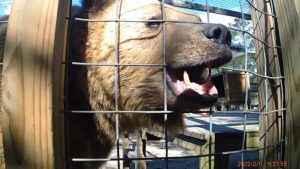
(Courtesy FWC)
Sanitation Issues, Escaped Animals, and Other Violations at Single Vision at the State Level
State inspectors have cited Single Vision Records for excessive amounts of feces and food waste in tiger and kinkajou enclosures, insufficient cage sizes, and enclosures in need of repair, according to public records obtained from the FWC.
State inspectors also documented wild animals inappropriately living within Bovard’s residence.
“Mr. Bovard had two juvenile hybrid bears in an enclosure on the back porch of his residence and a juvenile hyena living inside his residence that need to be moved to enclosures that meet their respective species caging requirements,” a state inspector wrote in February.
Other cited issues included an Arctic fox who escaped from an enclosure, a raccoon whose rabies vaccination information was not available, incomplete records and inaccurate inventories of animals on-site, inadequate safety barriers and cage strength, inadequate pool sizes for a tortoise, bears, and otters, and possessing a jaguar, tawny lion, and two white lions without documentation of their source.
In 2018, Bovard talked with authorities after having his head stitched shut following an attack. Bovard explained that while cleaning the cage of a 6-year-old cougar, the wild cat “became playful,” and that in response he “played around for a few minutes,” causing the cat to get “excited” and “play rough,” according to a witness statement obtained via state public records and Clay County Sheriff reports.
Bovard also reported being bitten by one of his Syrian bears in 2017, which state authorities attributed to a “handler error,” according to the public records documents.

(Courtesy FWC)
Robert Klepper, with the FWC’s Division of Law Enforcement, told Lady Freethinker that federal captive wildlife citations could affect a facility’s eligibility for a Florida captive wildlife permit but declined to comment specifically on Single Vision, instead referring LFT to the state’s captive wildlife rules and rules governing public contact, which he said all state licensees must follow.
Conflicting “Conservation” and Care Messaging at Single Vision
Single Vision notes on its page for Guidestar, an information service reporting on U.S. nonprofits, that its mission is “education about exotic and endangered animals” and adds that “educational programs” are an integral service.
The profile continues, “We provide up close and personal tours and interactions, filled with educational information and statistics, with our animal ambassadors in the hopes that the very personal experience people have at our facility helps them to be a better ambassador to our planet.”
Guidestar profiles have a section that asks nonprofits to explain their capabilities for accomplishing their stated missions. In that section, Single Vision classified that request as “difficult.”
“This is difficult for us, as there is only one owner/operator who also cares for all the animals and does all the tours,” Single Vision’s profile read as of Aug. 1. “We need more help but we work day and night to make our goals move in a forward direction.”
Despite that statement, Single Vision’s 990s – a government form required for nonprofit financial reporting – indicate the facility spent at least $25,000 on animal acquisition in one year alone.
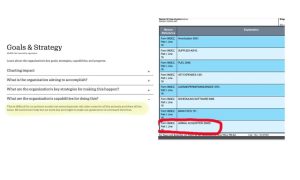
(Screenshots of Single Vision’s Guidestar profile and 990s)
The National Geographic Society defines conservation as “the act of protecting Earth’s natural resources for current and future generations.”
Lady Freethinker asked Bovard what key conservation messages he hopes visitors will take away from their experiences at Single Vision.
“We educate everyone who comes here about endangered species and conservation,” he said. “Everyone that leaves here has an educational experience and learns a lot more about the world.”
In past news reporting, Bovard also has offered his own thoughts on conservation.
“People say they belong in the wild but my question to them is – What wild?” Bovard previously told The Daily Mail. “There are 7 billion people on this planet, and we are destroying the habitat of these animals. Pretty soon the only tigers left are going to be those in captivity and they may need to be used to repopulate the wild. I do what I can to give these guys the best lives possible and I want to work to ensure more tigers and lions in captivity are better treated.”
Single Vision’s website shows that perspective entails creating unnatural conditions for wild animals, as evidenced in an animal biography for a caracal — a wild cat native to Africa and Asia — that notes, “Most evenings you can find him watching TV with Carl on the couch.”
The website also notes that Single Vision’s idea of what constitutes a “happy and healthy environment” for wild animals includes “daily interspecies play and human interaction.”
Single Vision claims on its website that its featured, paid interactions are “dependent on an animal’s mood,” but the public records documents show that interactions continued in spite of animal indicators to the contrary, including bear cubs who “became rowdy” and cubs who “nipped” at visitors.

Screenshot via Facebook (Redacted for privacy)
Single Vision’s documented interference with federal inspectors, whose responsibility it is to ensure that licensees are upholding the bare minimum welfare requirements mandated by federal law, also conflicts with the facility’s touted online statements that they provide “the best care and settle for nothing less for our exotic animals,” according to the facility’s website.
Lady Freethinker would like to remind our readers that while interactions with exotic wildlife involving physical contact with the animals might seem “fun” or “harmless” on the surface, animals involved in hands-on, pay-to-play interactions often suffer.
We encourage people to instead seek out opportunities at reputable sanctuaries that do not allow hands-on physical contact between people and wild animals and that are within the animal’s natural habitat and from a distance that won’t adversely impact the animals’ natural rhythms or welfare.
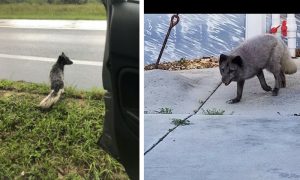
Escaped fox (Courtesy FWC)



